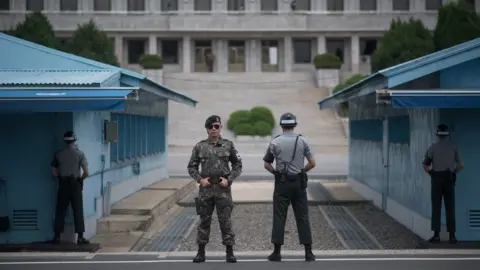North Korea-US tensions: How worried should you be?
The US president has threatened to "totally destroy" North Korea if his country is forced to defend itself or its allies.
North Korea has conducted its sixth nuclear test, threatened to fire off missiles towards the US island territory of Guam and said it might test a hydrogen bomb in the Pacific Ocean.
And all this comes amid reports that Pyongyang may have finally succeeded in miniaturising a nuclear weapon that could fit on an inter-continental missile - a prospect long dreaded by the US and its Asian allies.
Is this a precursor to military conflict?
Experts say you should not panic - just yet. This is why:
1. Nobody wants war
This is one of the most important things to keep in mind. A war on the Korean peninsula serves no-one's interests.
The North Korean government's main goal is survival - and direct conflict with the US would seriously jeopardise it. As BBC defence correspondent Jonathan Marcus notes, any North Korean attack against the US or its allies in the current context could quickly spiral into a wider war - and we have to assume the Kim Jong-un government is not suicidal.
In fact, this is why North Korea has been trying so hard to become a nuclear-armed power. Having this capability, it reasons, would protect the government by raising the costs of toppling it. Kim Jong-un does not want to go the way of Libya's Muammar Gaddafi or Iraq's Saddam Hussein.
Andrei Lankov of Kookmin University in Seoul told the UK's Guardian newspaper there was "very little probability of conflict" but North Koreans were equally "not interested in diplomacy" at this point.
"They want to get the ability to wipe out Chicago from the map first, and then they will be interested in diplomatic solutions," Mr Lankov said.
What about a pre-emptive US strike?
The US knows that a strike on North Korea would force the government there to retaliate against US allies South Korea and Japan.
This would result in a massive loss of life, including the deaths of thousands of Americans - troops and civilians.
Additionally, Washington does not want to risk any nuclear-tipped missiles being fired off towards the US mainland.
Finally, China - Pyongyang's only ally - has helped to prop up the North Korean government precisely because its collapse is deemed to be a strategically worse outcome. US and South Korean troops just across the Chinese border is a prospect that Beijing does not want to have to face - and that is what war would bring.
2. What you are seeing are words, not actions
President Trump may have threatened North Korea with language uncommon for a US president but this does not mean the US is actively moving on to a war footing.
As one anonymous US military official told Reuters news agency back in August: "Just because the rhetoric goes up, doesn't mean our posture changes."
New York Times columnist Max Fisher agrees: "These are the sorts of signals, not a leader's offhand comments, that matter most in international relations."
 AFP
AFPWhat is more, after North Korea's sixth nuclear test in early September and missile tests over Japan, the US has reverted to a tried and true tactic: squeezing Pyongyang through UN Security Council and unilateral sanctions.
And its diplomats are still speaking hopefully of returning to the negotiating table - pointing to support from China and Russia.
These send conflicting signals to Pyongyang but also moderate the tough rhetoric coming from President Trump.
Still, some analysts say a misinterpreted move in the current tense environment could lead to an accidental war.
"There could be a power outage in North Korea that they mistake as a part of a pre-emptive attack," Daryl Kimball, of US think tank Arms Control Association, told the BBC.
"The United States might make a mistake on the [Demilitarised Zone]. So there are various ways in which each side can miscalculate and the situation escalates out of control".
It is worth noting that US bombers recently flew close to North Korea in a show of force.
Days later North Korea's foreign minister said Pyongyang had the right to shoot down US bombers as President Trump had "declared war" on North Korea - a reference to a particularly pugnacious tweet from Mr Trump.
However it is not the first time that North Korea has accused the US of declaring war on it.
3. We have been here before
As former US Assistant Secretary of State PJ Crowley points out, the US and North Korea came close to armed conflict in 1994, when Pyongyang refused to allow international inspectors into its nuclear facilities. Diplomacy won out.
Over the years, North Korea has regularly made incendiary threats against the US, Japan and South Korea, several times threatening to turn Seoul into a "sea of fire".
And Mr Trump's rhetoric - in content, if not style - is also not exactly unprecedented from a US president.
"In many different forms, albeit not as colourful, the US has always said that if North Korea ever attacks, the regime will cease to exist," Mr Crowley writes.
The difference this time, he adds, is the US president has appeared to suggest he might take pre-emptive action (though Secretary of State Rex Tillerson has played this down.)
This kind of unpredictable, bellicose rhetoric coming from the White House is unusual and does have people worried, analysts say.
South Korea - the US ally with the most to lose from a confrontation with the North - has called for a cooling of rhetoric from both Pyongyang and the White House.
No one wants Kim Jong-un to think an attack might be imminent.


